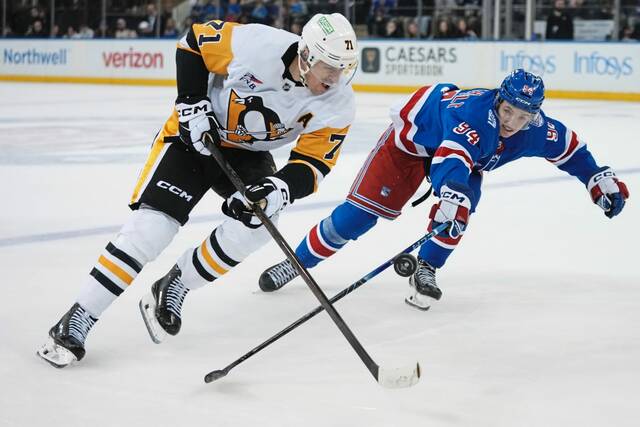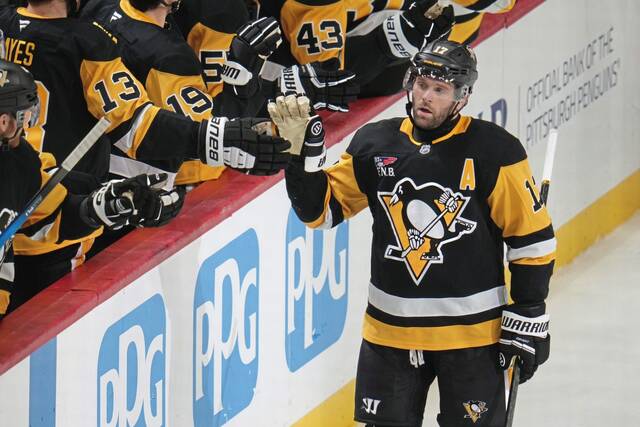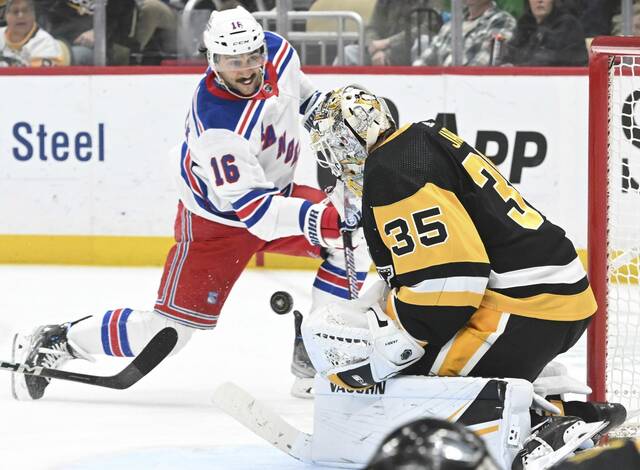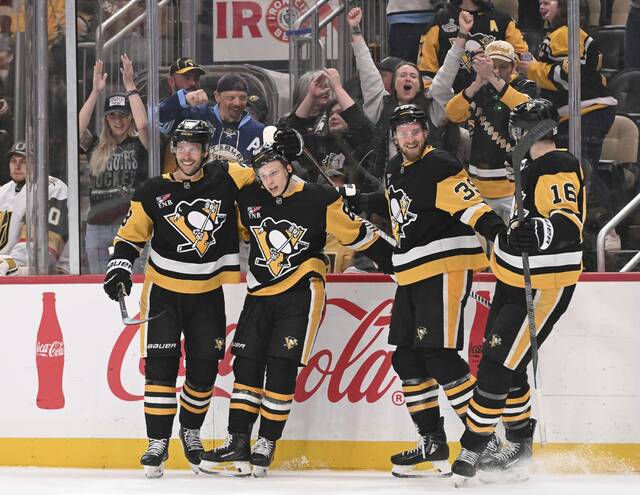While the NHL is on hold because of the ongoing coronavirus pandemic, the Tribune-Review will offer the Double Team project, an examination of the five best players who have contributed substantially to the Penguins and another franchise. For consideration, a player must have played at least the equivalent of a full season for each franchise. (Sorry, Jarome Iginla fans.)
Today, a look at the New Jersey Devils. The franchise came into the NHL in 1974 as the Kansas City Scouts. After two particularly terrible seasons on and off the ice, the Scouts looked west to Denver and became the Colorado Rockies. In six seasons, the Rockies only qualified for the postseason once. By 1982, things had gone downhill so far, the franchise was sold and moved to the Garden State. Named after the Jersey Devil, a mythical creature said to inhabit the Pine Barrens of South Jersey, the Devils existed in East Rutherford before moving to their current location in Newark in 2007.
In 241 all-time games against the Scouts/Rockies/Devils, the Penguins have a 106-109-26 record.
1. Petr Sykora, right winger
If the Devils played for the Stanley Cup, chances are Sykora was involved.
A first-round pick in 1995, the Czech native played for the Devils in three of their five Stanley Cup Final appearances (and even played against them while as a member of the Mighty Ducks of Anaheim in 2003).
Blessed with a dart of a left-handed shot, Sykora wasn’t exactly emblematic of the stagnant defensive style New Jersey deployed during their glory days. But he was certainly a marvelous fit as evidenced by the team’s on-ice success during his time in red and black.
Debuting in 1995-96 at the age of 19, Sykora appeared in 63 games and recorded 42 points, finishing seventh in voting for the Calder Memorial Trophy which recognizes the NHL’s top rookie. After bouncing between the NHL and American Hockey League (AHL) levels the next two seasons, Sykora had a breakthrough campaign in 1998-99 when he enjoyed the first of his 12 seasons with 20 or more goals, recording 29 goals as well as a team-leading 72 points in 80 games and helping the Devils claim the Atlantic Division.
In 1999-2000, Sykora formed the “A Line” with Jason Arnott and Patrik Elias, putting up 25 goals and 68 points in 79 games while helping lead the Devils to the franchise’s second Stanley Cup title, defeating the Dallas Stars.
A season later, Sykora established career-highs with 35 goals, 46 assists and 81 points in 73 games. During the postseason, he led the team with 23 points in 25 games as the Devils reached the Stanley Cup Final once again but fell to the Colorado Avalanche in seven games.
After seeing his production tumble to 48 points in 73 games during the 2001-02 season, Sykora was traded to Anaheim by July 2002.
Five years later, he joined the Penguins as a free agent signing. Initially hoped to be a linemate with franchise center Sidney Crosby, Sykora ultimately found a home on a line with the Penguins’ other franchise center in Evgeni Malkin.
Along with power forward Ryan Malone, that trio drove the Penguins throughout the 2007-08 season with Sykora recording 28 goals and 63 points for the Atlantic Division champions. In the postseason, the Penguins reached the Stanley Cup Final, losing to the Detroit Red Wings. Sykora contributed nine points in 20 games, including the winning goal in Game 5 of the Stanley Cup Final, a 4-3 road win in three overtimes.
Sykora had another fine season with the Penguins in 2008-09, scoring 25 points and 46 points in 76 games but a foot injury late in the regular season hobbled him throughout the postseason as he was limited to seven playoff games and a single assist. Regardless, he lifted the Stanley Cup for the second time that spring.
After bouncing between the Minnesota Wild and a handful of European teams the next two seasons, Sykora returned to the Devils on a tryout basis and earned a contract out of training camp. He rewarded the team with 21 goals and 44 points in 82 games and helped it reach another Stanley Cup Final, losing to the Los Angeles Kings.
He retired following the NHL’s 2012-13 lockout.
2. Paul Gardner, center
To say Gardner was one of the franchise’s best players before it moved to New Jersey wouldn’t be a stretch. It wouldn’t exactly be a compliment either.
It’s more of a statement of attrition. There aren’t really many candidates for that designation.
Gardner was selected by the Scouts in the first round of the 1976 draft in June. Less than two months later, he was a member of the Rockies. Debuting that fall, Gardner established a still-standing franchise record for rookies with 30 goals as well as 59 points in 60 games.
While injuries limited him to only 36 games in 1977-78, he still reached 30 goals as well as 52 points, helping the franchise qualify for the playoffs for the first time. He was in the midst of another strong season in 1978-79 with 23 goals and 49 points through 64 games but was traded to the Toronto Maple Leafs by March of 1979.
Largely struggling during parts of two seasons in Toronto, Gardner was traded to the Penguins in November of 1980 and resurrected his career with Pittsburgh. In 62 games during the 1980-81 season, Gardner scored 34 goals and set a career-high with 74 points.
He also became the first player in franchise history to score four goals in a game during a 6-5 home loss to the Philadelphia Flyers on Dec. 13, 1980.
Becoming a dominant force on the power play, Gardner led the team with 36 goals in 1981-82 while also putting up 69 points in 59 games. He also led the team with six points in five playoff games as the Penguins nearly upset the powerful Islanders in the preliminary round.
Midway through that season, Gardner was the victim of an attack by Winnipeg Jets forward Jimmy Mann who, in reaction to Gardner cross checking Jets forward Doug Smail’s head, sucker-punched Gardner, breaking his jaw in two places during a 6-1 home win by Winnipeg, Jan. 13, 1982.
Gardner simply wasn’t as effective following the injury. Powering through the 1982-83 campaign, Gardner appeared in 70 games and put up 28 goals as well as 55 points. After a rotten start to the 1983-84 campaign, Gardner was assigned to the AHL for most of the season. In July of 1984, he joined the Washington Capitals as a free agent.
3. Bill Guerin, right winger
The fifth overall pick of the 1989 draft, Guerin spent two seasons at Boston College and turned professional by 1991. A 6-foot-2, 220-pound power forward who could skate with anyone, Guerin established himself as a full-time NHLer in 1992-93 by recording 34 points in 65 games. He followed that up by breaking through to the 20-goal barrier with 25 goals, as well as 44 points, in 81 games.
During the lockout-shortened 1994-95 season, Guerin put up 25 points in 48 games then helped the Devils win the Stanley Cup for the first time in franchise history, sweeping the Detroit Red Wings.
Guerin remained a steady 20-goal threat the next two seasons, including a 29-goal effort in 82 games during the 1996-97 campaign.
A contract holdout at the start of 1997-98 led to Guerin being traded at the age of 27 to the Edmonton Oilers by January of 1998.
Just over 11 years later, Guerin was traded by the New York Islanders to the Penguins at the 2009 trade deadline. More of a net-front presence than mobile power forward at this point, a 38-year old Guerin found a home on Crosby’s line and helped the Penguins win the franchise’s third Stanley Cup championship by recording 15 points in 24 playoff games.
After a 21-goal, 45-point effort in 78 games during 2009-10 with the Penguins, Guerin retired.
4. Paul Martin, defenseman
Martin was out of central casting for what the Devils wanted out of their defensemen in the mid to late 2000s. He operated within the confines of the system, never freelanced and made the correct, by-the-book play.
A second-round pick in 2000, Martin debuted in 2003-04, putting up 24 points in 70 games. Over the next four seasons, he was a safe bet to appear in 70-plus games and reach the 30-point mark. During his six seasons with New Jersey, the Devils won the Atlantic Division four times.
Despite missing most of the 2009-10 season because of a broken arm — which also cost him a chance at representing the U.S. in the Olympics — Martin was a highly-sought free agent in the 2010 offseason and signed a five-year contract with the Penguins.
Joining a team which had a far more aggressive approach to everything than the Devils, Martin’s play largely remained the same during his half-decade with the Penguins. While he did struggle throughout the 2011-12 season, Martin was largely a reliable presence on the Penguins’ blue line throughout his tenure in Pittsburgh.
His finest moment with the Penguins might have come during the 2013 postseason. Helping the Penguins reach the Eastern Conference final, Martin was was fifth on the team with 11 points in 15 games.
Primarily serving as All-Star defenseman Kris Letang’s partner throughout the 2014-15 season, Martin left during the ensuing offseason as a free agent, joining the San Jose Sharks.
5. Jaromir Jagr, right winger
This was just an odd marriage. A dynamic offensive force and a free spirit, Jagr was just out of place with the defensive Devils and their buttoned-down conformist culture.
But that doesn’t mean he wasn’t a quality player, particularly as 40-something, during his brief time in New Jersey.
After losing star forward Ilya Kovalchuk, who bolted to Russia’s Kontinental Hockey League in July of 2013, the Devils signed Jagr in part to replace Kovalchuk’s offense as well his box office appeal. For the most part, Jagr did the former, recording 26 goals and leading the team in assists (43) and points (67) during 2013-14 but the Devils missed the postseason.
Jagr largely struggled through the 2014-15 season due in part to his age as well as simply being a poor fit with the conservative Devils. After 57 games and 29 points, he was traded to the Florida Panthers.
Of course, Jagr’s greatest days came in Pittsburgh. The fifth-overall pick of the 1990 draft, an 18-year-old Jagr helped the Penguins win their first two Stanley Cup titles in 1991 and 1992.
He won the Art Ross Trophy, as the league’s top scorer, for the first time during the lockout-shortened 1994-95 season with 70 points (32 goals, 38 assists) in 45 games. The following season, Jagr put up 149 points in 82 games, second in the NHL to linemate Mario Lemieux’s 161 points.
After Lemieux’s first retirement in 1997, Jagr won another Art Ross Trophy in 1997-98 with 102 points. He followed that in 1998-99 by winning the Hart Memorial Trophy as league MVP for the only time in his career as well as the Art Ross Trophy again with 127 points.
Jagr spent two more seasons in Pittsburgh and won the Art Ross Trophy twice, with 96 points in 1999-2000 and 121 points in 2000-01 before requesting a trade that sent him to the Washington Capitals in July of 2001.
Still an active player in his native Czech Republic, Jagr is the NHL’s second-leading all-time scorer with 1,921 points.
Honorable mentions: Chuck Arnason, right winger; Denis Herron, goaltender; Mark Johnson, center; Dennis Owchar, defenseman; Mike Rupp, center.








